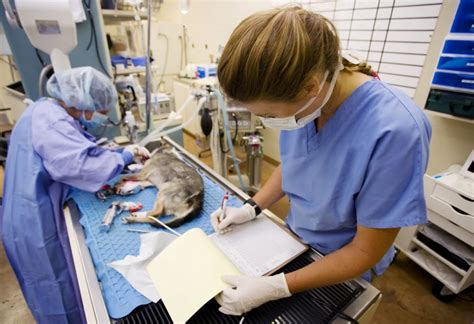Are you a veterinary technician looking for a change of pace or a new challenge? Or perhaps you're a recent grad looking to break into the field? Whatever your situation, vet tech relief jobs can be a great way to gain experience, build your skills, and make a difference in the lives of animals. In this article, we'll explore five vet tech relief jobs to consider, along with their requirements, benefits, and growth opportunities.
The demand for skilled veterinary technicians is on the rise, driven by an increasing pet population and advances in veterinary care. Relief vet techs play a vital role in supporting veterinary clinics, hospitals, and research institutions by providing temporary staffing solutions. Whether you're looking for flexibility, variety, or a chance to specialize, relief vet tech jobs can offer a rewarding and fulfilling career path.
What are Vet Tech Relief Jobs?
Vet tech relief jobs involve working on a temporary or contract basis in various veterinary settings. These roles can range from general practice clinics to specialty hospitals, research institutions, and even zoos. Relief vet techs are essential in ensuring continuity of care, supporting permanent staff, and providing expertise in specific areas.
Benefits of Vet Tech Relief Jobs
Relief vet tech jobs offer numerous benefits, including:
- Flexibility: Choose from a range of assignments, locations, and schedules to suit your lifestyle and preferences.
- Variety: Experience different work environments, cases, and procedures, broadening your skills and knowledge.
- Autonomy: Work independently, making decisions and taking responsibility for patient care.
- Professional growth: Develop your skills, build confidence, and stay up-to-date with the latest techniques and technologies.
- Competitive pay: Earn a competitive hourly rate, often with benefits and bonuses.
5 Vet Tech Relief Jobs to Explore
Here are five vet tech relief jobs to consider, each with its unique requirements, benefits, and growth opportunities:
1. General Practice Relief Vet Tech
- Requirements: RVT or CVT certification, 1-2 years of experience in general practice
- Benefits: Flexibility, variety, and autonomy in a fast-paced environment
- Growth opportunities: Develop skills in patient assessment, laboratory procedures, and client communication
General practice relief vet techs work in clinics, providing routine care, conducting lab tests, and assisting with surgeries. This role is ideal for those who enjoy working with a variety of cases, from wellness exams to emergency care.

2. Specialty Hospital Relief Vet Tech
- Requirements: RVT or CVT certification, 2-5 years of experience in a specialty hospital
- Benefits: Opportunities to work with complex cases, develop specialized skills, and collaborate with experienced professionals
- Growth opportunities: Enhance skills in areas like surgery, anesthesia, or diagnostic imaging
Specialty hospital relief vet techs work in hospitals that focus on specific areas, such as surgery, cardiology, or oncology. This role is ideal for those who enjoy working with complex cases, developing specialized skills, and collaborating with experienced professionals.

3. Research Institution Relief Vet Tech
- Requirements: RVT or CVT certification, 1-3 years of experience in research or academia
- Benefits: Opportunities to work on cutting-edge projects, develop research skills, and contribute to scientific advancements
- Growth opportunities: Enhance skills in areas like laboratory procedures, data collection, and study design
Research institution relief vet techs work in research institutions, universities, or government agencies, supporting studies and projects that advance veterinary medicine. This role is ideal for those who enjoy working in a research environment, developing skills in laboratory procedures, and contributing to scientific advancements.

4. Emergency Relief Vet Tech
- Requirements: RVT or CVT certification, 1-2 years of experience in emergency medicine
- Benefits: Fast-paced environment, opportunities to work with critical cases, and develop skills in emergency procedures
- Growth opportunities: Enhance skills in areas like triage, stabilization, and emergency surgery
Emergency relief vet techs work in emergency clinics or hospitals, providing care to critically ill or injured patients. This role is ideal for those who enjoy working in a fast-paced environment, developing skills in emergency procedures, and making a difference in the lives of animals.

5. Zoological Relief Vet Tech
- Requirements: RVT or CVT certification, 1-3 years of experience in zoological medicine
- Benefits: Opportunities to work with exotic species, develop skills in zoological medicine, and contribute to conservation efforts
- Growth opportunities: Enhance skills in areas like animal behavior, nutrition, and habitat design
Zoological relief vet techs work in zoos, wildlife sanctuaries, or conservation organizations, providing care to a variety of exotic species. This role is ideal for those who enjoy working with unusual animals, developing skills in zoological medicine, and contributing to conservation efforts.

Conclusion
Vet tech relief jobs offer a flexible, rewarding, and challenging career path for veterinary technicians. Whether you're looking to gain experience, build your skills, or make a difference in the lives of animals, there are numerous opportunities to explore. From general practice to specialty hospitals, research institutions, emergency clinics, and zoos, relief vet tech jobs can provide a sense of fulfillment and purpose. So why not consider a career as a relief vet tech? With the right training, experience, and attitude, you can make a real difference in the world of veterinary medicine.






What is a relief vet tech?
+A relief vet tech is a veterinary technician who works on a temporary or contract basis in various veterinary settings.
What are the benefits of relief vet tech jobs?
+Relief vet tech jobs offer flexibility, variety, autonomy, professional growth, and competitive pay.
What types of relief vet tech jobs are available?
+Relief vet tech jobs are available in general practice clinics, specialty hospitals, research institutions, emergency clinics, and zoos.
